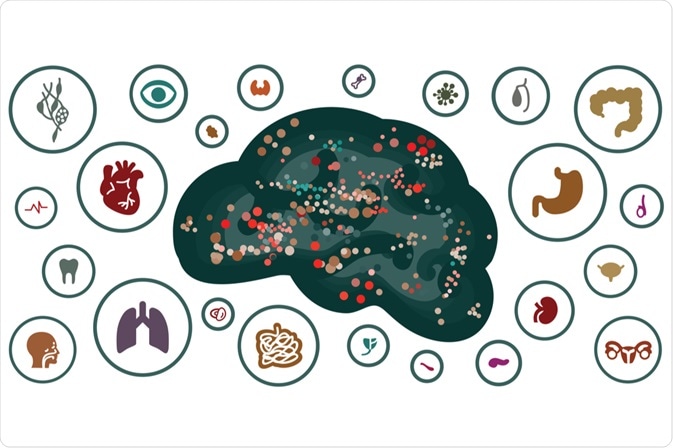The term psychosomatic disorder is used to refer to a condition in which a physical disease is thought to be caused or made worse by mental stress or related factors.
Since this disorder correlates with the mind and body, its treatment also involves remedial measures from both medical and psychological fields.
A person with a psychosomatic illness is first screened for the presence of stress factors before the appropriate treatment is provided.

Image Credit: magic pictures / Shutterstock.com
Treatments for psychosomatic disorder
Each person experiences different medical illnesses due to physical stress. Physical diseases caused by mental factors can be treated either through medication or surgeries; however, the complete cure from this condition can be achieved only when the cause for the generation of the mental stress is identified. Thus, the therapies to alleviate these psychological factors like stress, anxiety, and depression are essential to healing the physical disease.
Psychotherapy: This is also known as talking treatment. Here, the doctor and the patient have an interaction about the mental status and lifestyle events that the patient experiences. This interaction helps the therapist to analyze the particular mental illness that the patient is suffering from to provide the appropriate therapy.
Psychoanalysis: This therapy is used to treat depression and anxiety disorder. It is a lengthy process that involves two to five sessions per week for several years. The psychoanalyst will make a note of the patient’s childhood memories and dreams that play a role in the patient's mental status.
Cognitive behavior therapy (CBT): CBT focuses on the examination of the patient’s thoughts and beliefs that impact his/her mental condition. This form of therapy helps to overcome those feelings of the patient that lead to an alteration in his/her behavior. It enables the patient to overcome negative situations like depression, anger, phobias, and chronic pain, to name a few. Sessions can vary based on the severity of the patient’s condition.
Group psychotherapy: Group psychotherapy typically involves 5 to 15 patients in a group under a trained psychiatrist. They are given the practice to attain a normal balanced attitude. This therapy is for patients who have relationship difficulties, medical illness, etc. The group assembles in a private place for 1 to 2 hours every week.
Electroconvulsive therapy (ECT): This type of therapy IS mainly provided for patients with severe depression and other mental conditions. It involves the transition of a stable electric current through the brain in order to trigger its activity to relieve symptoms of mental illness. ECT is given for a period of one month with certain intervals and is safer and more effective as compared to treatment with medication.
Hypnotherapy: Hypnosis induces a trance-like (unconscious) state in which the conscious control of the mind is suppressed and the subconscious mind is revealed, through which the hypnotist can understand the state of mind of the patient. Hypnotherapy is used to treat stress-related disorders like insomnia and other conditions that are worsened by tensions like irritable bowel syndrome, psoriasis, and eczema, for example.
Abreaction therapy: This is a therapy used to relieve the emotions associated with traumatic events. The duration required for this type of therapy is longer as compared with other therapies and is not used widely.
Acupuncture therapy: The basic principle of this therapy is stimulating the points in the body by use of needles, to correct irregularities in the flow of energy through channels known as meridians. This is primarily used to treat anxiety and depression. Sessions may vary on the basis of the patient’s relief from stress factors. Many patients sense a deep feeling of relaxation after acupuncture treatment.
Auxiliary treatments for psychosomatic illness
Pharmacotherapy: This is a supportive treatment provided along with psychotherapy and ECT. It reduces depression and anxiety by administration of antidepressants and anxiolytics, respectively. This therapy improves the mental disturbances in the patient only after several weeks.
Psychosomatic physiotherapy: This therapy focuses on attaining better health for the patient by regulating the emotional balance in the mind.
Exercises: Physical activity is known to improve both bodily and mental health in psychic patients by relieving them of psychiatric and social disabilities. In fact, studies have suggested that exercises can improve social interaction, physical body perception, etc.
Yoga: In mentally ill patients, breathing methods (pranayama) and meditation are quite effective to relieve stress. When the breath is held, the muscles are strained so that the stress, fear, and other factors are rejected for a certain time. Prolongation of the time period has an effect on the thoughts and feelings of psychosomatic patients.
Osteopathy: This therapy involves the employment of hand pressure (massage) to reduce stress. The objective of this manual medicine is to provide a positive influence on the nervous, circulatory, and lymphatic systems of the body. The therapy helps to reduce anxiety and pain and provides an opportunity for the patient’s body to heal itself.
Lifestyle changes: Limiting caffeine intake, eating a balanced diet, having vitamin supplements, and avoiding alcohol and smoking can also relieve anxiety to a particular extent.
References
Further Reading
Last Updated: Apr 8, 2023